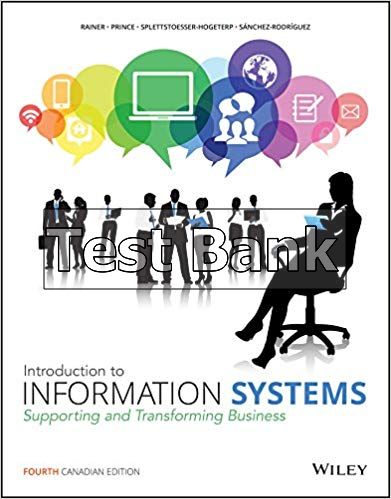Introduction To Information Systems Canadian 4th Edition By Rainer – Test Bank
Digital item No Waiting Time Instant DownloadISBN-10: 1119309905 ISBN-13: 978-1119309901Publisher : WileyAuthors: R. Kelly Rainer
In Stock
Original price was: $55.00.$30.00Current price is: $30.00.
Introduction To Information Systems Canadian Ed By Rainer – Test Bank
TABLE OF CONTENTS
Test Bank for Introduction to Information Systems, Canadian 4th Edition by Rainer
The “Test Bank for Introduction to Information Systems, Canadian 4th Edition” by R. Kelly Rainer, Brad Prince, and Casey G. Cegielski is an essential educational resource designed to support both educators and students in mastering the fundamental principles and applications of information systems. This comprehensive test bank complements the textbook by offering a variety of questions that assess and reinforce understanding of key concepts and practical skills, making it an invaluable tool for both teaching and learning. Below is a detailed overview of the components and benefits of this test bank:
Overview of Test Bank Content
- Chapter-by-Chapter Organization
- The test bank is meticulously organized to align with each chapter of the textbook. This ensures comprehensive coverage of all critical topics and provides a structured approach to assessment, facilitating easy integration into the curriculum and enabling targeted learning.
- Types of Questions
- Multiple-Choice Questions (MCQs): These questions cover a broad spectrum of knowledge, from basic recall to complex application and critical thinking. Each question includes well-crafted distractors to challenge students’ understanding.
- True/False Questions: These questions assess students’ ability to distinguish between correct and incorrect statements, reinforcing factual knowledge and addressing common misconceptions.
- Fill-in-the-Blank Questions: These questions focus on recalling specific details such as key terms, processes, and important concepts, testing students’ memory and understanding.
- Short Answer Questions: These questions require detailed yet concise responses, evaluating students’ ability to explain information systems concepts clearly and accurately.
- Essay Questions: These questions assess students’ ability to synthesize and articulate complex ideas, demonstrating a deep understanding of information systems principles and their applications.
- Case Studies and Scenarios: Real-world scenarios and case studies help students apply theoretical knowledge to practical situations, enhancing their critical thinking and problem-solving skills.
- Diagram-Based Questions: These questions involve interpreting, analyzing, or creating diagrams related to information systems, reinforcing visual and analytical skills.
- Difficulty Levels
- Questions are categorized by difficulty to provide a range of challenges and assess students’ proficiency at different levels, including:
- Basic: Testing foundational knowledge and comprehension.
- Intermediate: Requiring application of knowledge to practical information systems scenarios.
- Advanced: Involving critical thinking, analysis, and synthesis of complex information systems information.
- Questions are categorized by difficulty to provide a range of challenges and assess students’ proficiency at different levels, including:
- Core Focus Areas
- Introduction to Information Systems: Questions covering the basic principles and scope of information systems, including the role and importance of information systems in organizations.
- Information Technology Infrastructure: Detailed coverage of IT infrastructure, including hardware, software, and networking fundamentals.
- Data and Knowledge Management: Assessing knowledge of data management principles, databases, data warehouses, and knowledge management systems.
- Business Intelligence and Analytics: Focus on business intelligence, data analytics, and decision support systems.
- Telecommunications and Networks: Examining telecommunications, network types, protocols, and security considerations.
- The Internet and E-Business: Questions on the role of the internet, e-commerce, and e-business models.
- Information Systems within the Organization: Coverage of enterprise systems, including ERP, CRM, and SCM systems.
- Ethical and Social Issues in Information Systems: Assessing understanding of ethical, legal, and social issues related to information systems.
- Security and Privacy: Focus on information security principles, threats, risk management, and privacy issues.
- Systems Development and Project Management: Examining systems development life cycle (SDLC), methodologies, and project management techniques.
- Global Information Systems: Questions on the impact of information systems on global business operations and strategies.
- Alignment with Learning Objectives
- Each question in the test bank is aligned with the learning objectives outlined in the textbook, ensuring that assessments are relevant and targeted toward achieving the intended educational outcomes. This alignment helps in accurately measuring students’ progress and comprehension.
- Educational Support and Utility
- For Educators: The test bank provides a comprehensive resource for creating quizzes, exams, and other assessments. It simplifies the process of test creation and ensures consistency and alignment with the curriculum.
- For Students: The test bank serves as a valuable tool for self-assessment and study. It helps students verify their answers, understand their mistakes, and learn the correct approach to solving information systems problems.
Benefits of Using the Test Bank
- Enhanced Learning and Retention
- The diverse range of question types and difficulty levels helps reinforce learning through varied and repeated exposure to key concepts, enhancing retention and understanding.
- Preparation for Real-World Applications
- By focusing on real-world scenarios and practical applications, the test bank prepares students for the practical aspects of information systems, ensuring they are ready to apply their knowledge in professional settings.
- Comprehensive Assessment
- The test bank allows for thorough and multi-faceted evaluation of students’ knowledge and skills, from basic understanding to advanced application, ensuring a well-rounded educational experience.
- Efficient Teaching Resource
- For educators, the test bank simplifies the process of creating assessments, providing a consistent and reliable tool for evaluating students’ progress and readiness for advanced studies in information systems.
Conclusion
The “Test Bank for Introduction to Information Systems, Canadian 4th Edition” by R. Kelly Rainer, Brad Prince, and Casey G. Cegielski is an essential resource for information systems education. It provides structured, comprehensive, and versatile tools for assessing and enhancing students’ knowledge and skills in information systems. By aligning closely with the textbook and emphasizing real-world application, the test bank supports the development of competent, confident professionals ready to excel in their understanding and application of information systems principles in various business and technological settings.


Reviews
There are no reviews yet.